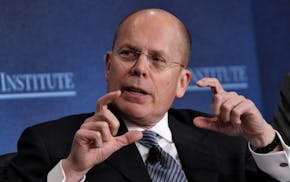Allina Health doctors picketed in the rain outside four clinics at 6 a.m. Tuesday, hopeful that a show of unity would kickstart their languishing contract talks. Then the doctors hustled off to see patients.
The one-hour protest of Allina's Coon Rapids clinic was barely observed by daylight, much less the public, but the recently unionized doctors, nurse practitioners and physician assistants said they had history on their side.
The protest was believed to be the first in Minnesota involving doctors engaged in their own union contract dispute.
"We don't have people who can come out over lunch and picket, you know?" said Dr. Matt Hoffman, the clinician at Allina's Vadnais Heights primary care clinic who has led the union movement. "They're getting to work at 8 a.m. and pretty much working through the whole day. So we had to find a time when people were actually free to come out."
Contract talks have stalled between about 600 Allina primary care clinicians and their employer, especially when it comes to the amount of time spent on paperwork and responding to patient emails, he said. The doctors want compensation for some of this administrative time, which is eating up more of their day and leaving them with piles of records and messages at night.
Negotiations over the past 15 months have resulted in tentative agreements in other areas, such as control over scheduling and a mentorship program for young doctors, Hoffman said. But Allina has rejected the request to pay for up to four hours per week of administrative time, he said, and to guarantee staffing levels of support workers such as clinical assistants and diabetes educators.
"We need to be there taking care of our patients," Hoffman said. "When you have people leaving primary care because they're burned out, that's not good for anybody."
Allina said it wants to reach a contract with its union doctors that provides competitive pay and benefits "while ensuring that we can sustain our caring mission during these extremely uncertain economic times."
"Allina Health and the union were fully aware they would be charting new territory in creating these first contracts, and it is important to get it right," Allina said in a statement Tuesday.
The protests at Allina clinics in Coon Rapids, Bloomington, Maplewood and West St. Paul marked a busy 2025 for union activity in health care. Over the past two months, 250 resident doctors at Hennepin Healthcare and nearly 1,000 residents and fellows at the University of Minnesota have unionized to seek protection from excessive hours and burnout.
On Wednesday, thousands of union nurses will protest in front of Twin Cities and Duluth-area hospitals over staffing levels and safety concerns on the job. Contracts technically expired at the end of May for more than 10,000 union nurses working at Allina, Children's, Fairview and North Memorial hospitals, but the terms of their old deals remain in effect while talks continue.
Several nurses joined with about 50 clinicians, picketing in rainy and hazy conditions in Coon Rapids. Chris Rubesch, a Duluth nurse and president of the Minnesota Nurses Association, said the back-to-back protests complement one another.
"We are echoing the same message," he said. "Our health care system is broken, and we need to fundamentally reassess how we treat and care for patients in this country."
About 600 Allina doctors and other primary care clinicians voted in 2023 to seek union representation from Doctors Council, the largest private-sector doctors union in the U.S.
More than 130 Allina ER and inpatient doctors at Mercy Hospital in Coon Rapids also unionized in 2024, seizing on pro-union sentiment that emerged after the workplace stresses of the COVID-19 pandemic. A couple of the Mercy doctors joined the picket line Tuesday. Their contract talks are ongoing.
Picketing was new for the doctors. One tried to start a chant, "I say union, you say power!" and was met with silence. The group eventually caught on to the cadence.
Dr. Chris Filetti, an Allina pediatrician in Cambridge, wore a shirt and tie under his rain poncho. His morning shift started at 7:30 a.m. Pressures were building on doctors before the pandemic, he said, who are being asked to do more work than can fit in a day.
"I'm going to retire soon — five, 10 years," he said. "It's not for me. It's for the future generations [of doctors]. I'm going to be a patient, too."

UnitedHealth shareholders give tepid support to $60M in stock-based pay for new CEO
Target recalls more employee groups to downtown Minneapolis headquarters

Ronzoni pasta-maker coming to Lakeville in $880 million Post acquisition

$200M acquisition by Minneapolis company will help it aid other firms make deals

